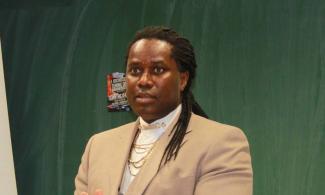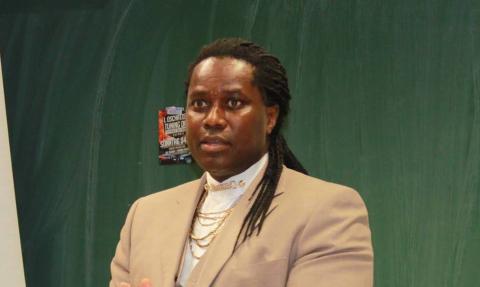
Who is he that has no conscience and travels the world without feeling the pains of sufferings in Nigeria? Just what have we turned to?

When I made up my mind to celebrate New Year in Abu Dhabi – capital city of the United Arab Emirates – very late in 2019, I knew I’d be courting emotional troubles once again. Having gone through harrowing self-inflicted emotional trauma by visiting Dubai – another major commercial hub of the same emirate – a few years back, there was no point thinking about what to expect in Abu Dhabi. After all, it is the same oil-rich emirate of the Arabian desert.
In Dubai three years ago, I shed internal tears, weeping for my country, Nigeria, at the sight of the feat that oil money has achieved under a focused and committed leadership in the Arabian Peninsula. But seeing Abu Dhabi exceed all my expectations in triggering sorrow, tears and dejection. I could only wish for the most vicious, damning and torturous experience for leaders that have brought this shame upon Nigeria.
It is not so much the pomp and glamour of these cities, the glittering shine of the towering skyscrapers that stands out even more in Dubai, it is not the immaculate purity of combined sceneries matching roads, architecture and vegetation in the natural habitat,l that matter. No. It is the history and the statistics that make up the survival of this entity that is so mind-boggling to anyone, who cares to ask if African leaders learn from their neighbours at any opportunity.
It doesn’t take long to figure out that the city, Abu Dhabi, is largely built on a desert land as is Dubai. A drive through the countryside down to what is left of the desert reveals a lot.
The making of glamorous cities out of ancient fishing villages and Berber settlements as documented in museums and seen by the naked eyes is not so much the problem as the statistics rolled out by neutral instances highlighting a level of affluence that is boastfully enhanced by – hold your breath – oil money.
Oil that Nigeria has in abundance. Oil that has fetched Nigeria so much money that a former military Head of State once said very honestly that “Money is not our problem but how to spend it”. Probing to find out more about this country, I started stumbling onto facts and figures.
Problem No. 1 in comparison:
This is a sparsely populated country that has 9.1 million people overall by the last known count in 2016. Just one million of this overall population represents the indigenous citizens that are defined as those “whose ancestors had lived in the seven constituting emirates before 1925”. In other words, 90 per cent of the Emirate citizens are foreigners. Their sweat and labour paid for by the oil money of the soil and the fantasies and creative prowess of science and technology have developed the emirate to its present enviable status.
Yet no one calls Dubai, Abu Dhabi or any of the other five Emirates within the federation “no man’s land”. In Nigeria, it takes a marginal proportion of industrious and commercial internal migration to declare a city “no man’s land” and begin to contest indigenous proprietary. This is issue number one as it relates to comparison with our own dear country and our home-grown troubles.
In a country in which leadership caters for the people, it can be seen everywhere in the United Arab Emirates how much leaders have spent on public welfare. Based on statistics released in 2016, sources claim that an average indigenous family earns close to $20,000 each month while the average family of foreign workers earn an average of $7,600 each month. Every indigenous citizen works for the state and all public utility works that sustain the day-to-day running of public life rest on the shoulders of foreign settlers and workers.
Problem No. 2 in comparison:
While it will be easy for a Nigerian to say that the population of that country is not even half as many as Abuja’s population and is, therefore, not worthy of comparison, I will implore our people to imagine what it takes to develop a desert into a blossoming farmland and settlement areas with drinking water, electricity and other infrastructure to understand the role of the mindset as opposed to population.
The decision to develop Dubai’s New City on a desert with the most modern of edifices on earth that are envied even by New York and Sydney are a question of mindset and not population. Each of the seven emirates in the UAE are comparable to states in Nigeria and they are self-governing in the federal arrangement. Each state processes its own resources and manages them for survival. That is precisely the true federation that some are clamouring for in Nigeria. Yet, will the mindset permit the proper delivery of that function in a tension-riddled Nigeria? Moreover, since oil as the mainstay of the UAE is not foreign to any of the federating units, there is some level playing field of sort in the individual dispensation of federal governance. The imbalance in a Nigerian scenario is, however, a foregone conclusion. This is not to say, though, that oil is available to every federating unit of the UAE on equal proportion.
As of 2010, the oil in the Emirate of Dubai was projected to dry out within the following 20 years. Today, oil proceeds account for less than one per cent of Dubai’s GDP. In 2009, Dubai’s economy collapsed under the weight of falling oil prices and the credit crunch. Neighbouring emirate, Abu Dhabi, bailed it out.
With exotic edifices like the tallest building in the world, Burj Khalifa, and the surfing boat-shaped Burj El-Arabia – both hotels of high international standards, tourism has become a major replacement for oil in Dubai. Visitors clamour to see the beauty of the entire modern city that is conceived to surpass the pageantry of any imaginable western town-planning wizardry that now lives on Victorian and Elizabethan history.
In Abu Dhabi, the Emir builds a palace covered in the ornamental beauty of gold for international summits.
The same palace houses a presidential library.
Since this building is not on daily use, it is open to public view at a modest fee. The number of visitors thronging in on daily basis from all over the world to catch a glimpse of these massive architectural wonders are enough to rake in the millions of dollars lavished on the project, within a given period. Even the massive white mosque that has now become the symbol of Abu Dhabi, attracts non-Muslim visitors from all over the world to see the massive architectural wonder-work. Lessons that Nigeria has not learned.
Nigeria:
Now, let us return to Nigeria. Where do we stand today with our oil wealth? We are unable to deliver common power supply to our daily lives. The Minister of Power blames his predecessor for poor power supply but his predecessor was removed only a few months ago. His predecessor blames the government before his for the woes in the power sector. The President of the government blames his favorite enemy asking “Where is the power” after controversially accusing his predecessor of spending $16thbn on the sector – a figure that is open to serious questions though. Now, the power minister, while shifting the blame to his own predecessor, is saying today, “All right-thinking Nigerians are aware that since assuming power in 2015, President Muhammadu Buhari has poured billions of naira and attracted huge foreign investments into the power sector with the aim of improving the generation and distribution of electricity to Nigerians… Nigerians should be asking why there was not much improvement in the sector after such concerted efforts by the government.”
This minister is now virtually asking his own President, “Where is the power?” While the blame game is going on, we are consistently and steadily being left behind by our peers with the blinded folks resigning to their fate.
Countless times, well-meaning Nigerians ask themselves if our leaders ever travel to other countries. What leader of conscience will visit Dubai or Abu Dhabi from a pitiable state like Nigeria and not shed tears and rather choose to buy houses there?
What leader is it, who will consider enriching himself in galactic dimensions to compare with the millionaires and billionaires of this world, before developing his own country, if he has conscience?
Today, Nigerian leaders are prioritising regional power balance, silencing critics, empowering and enriching relatives over the serious problem of building infrastructures not to talk of poverty eradication. When will the right priority be set?
It has become so bad that armed insurgency is even secretly encouraged to allow the military have disproportionate allocation to steal from at the cost of military efficiency. Lives are lost. Living is lost.
Has any of our leaders ever visited Malaysia? A taxi driver will proudly tell you how safe his country is. A lady can roam the street alone at any time of the day or night and go back home to sleep safely.
In our Nigeria however, a low-ranking officer of the State Security Service will work over zealously to breach his bounds and the rights of individual citizens because he has a generator at home to power his refrigerator. Fighting crime is the least of his worries; never mind that his initial priority should have been external intelligence to secure the country.
In the end, one wonders, where the people are. Those that should rise up to put an end to this whole rot once and for all stand up in vehemence defense of the disorder as long as they are given stipends to support the government. The all-powerful social media that has now become a potent means of opinion-formation is their regular home-base. I learnt recently (even though yet unproven and should be taken with a pinch of salt) that it takes just a monthly stipend of N250,000 to do the trick and keep the population paralysed to its own oppression. The despicable tradition of paying government agents to rampage on the social media with propaganda is however, nothing new and was also largely rumored in the government of President Goodluck Jonathan.
People travel to Dubai and are desensitised. They take photos and return to base. Some sit in the comfort of London raking in payments to write irrationally and stand logic on its head all for gratifications? Then the only man that stands up to ask for a revolution is dumped in the dungeon to their thunderous applause in the name of gratifications?
That there is no credible replacement for this government at the present moment cannot be a license to impunity and misgovernance as is presently seen.
Who is he that has no conscience and travels the world without feeling the pains of sufferings in Nigeria? Just what have we turned to?